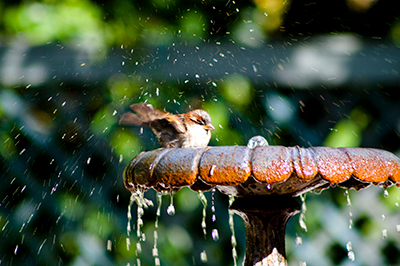COVID-19 has had a huge impact on people across the globe and locally. People are spending more time at home, and in turn, have developed new home- and yard-based hobbies. This year more than ever, people are working in their gardens and starting backyard birding. The birding trend has really taken off, and in turn, there are a lot of beginners out there! This is the perfect time to review the different things you can do in your yard to attract more birds. Birds, like most other animals, have basic needs to survive and thrive: a source of water, food, shelter, and a place to raise young. By providing a mix of these you’ll be quite surprised at the diversity of birds you are able to attract!

Water is one of the simplest things you can put out to attract more birds. This can be in the form of a birdbath, pond, or moving water feature. Moving water brings in more birds than standing water. They are attracted to the sound and movement it causes. It also helps keep mosquitoes out! If you have a birdbath, I highly suggest adding a solar fountain to it. When the sun hits the solar panel, the water begins spraying upwards, creating a small fountain. Birds will drink from water features and hummingbirds may even fly through the mist that the moving water creates. Birds need water to drink from as well as to clean their feathers. Not all birds will come to a bird feeder or birdhouse, but they all need a source of water. Robins, for example, do not nest in a house and typically do not come to feeders, but they will spend the better part of a day enjoying a dip in a birdbath. Water is also a great way to attract migrating birds like warblers and scarlet tanagers.
Food is another common way to bring more birds into your yard. Birdfeeders and native berry-producing shrubs are a great way to do just that. If you are adding a birdfeeder to your yard make sure you have at least one that provides black oil sunflower or a black oil sunflower mix. Black oil seed will get you the most diversity of any one type of seed, and the more diversity of foods you add the better. Cardinals, chickadees, finches, grosbeaks, and nuthatches are just some of the birds that will eat sunflower seed. Nyjer, or thistle seed, is great for the bright yellow goldfinches. Adding peanuts to the mix will help to attract blue jays, nuthatches and titmice. Suet cakes are blocks of fat that go in a square cage feeder. Suet will attract woodpeckers like the downy, hairy, red-bellied, and, if you’re lucky a pileated! Oranges and grape jelly are favorites that will attract orioles in the spring, and homemade nectar will bring in hummingbirds. If you are feeling adventurous, mealworms can attract bluebirds and other songbirds, especially once their young have hatched. There are many different species of birds that feeders will bring to the yard!
Birdhouses are a source of shelter and a place to raise young. They come in all shapes and sizes. The size of the bird house and especially its hole will dictate what kind of birds can use it. The smaller the size of the opening, the more it limits what birds can fit inside. Not all birds will nest in houses, but many do. Bluebirds, nuthatches, chickadees, woodpeckers, wrens, swallows, and even screech owls will nest in houses. Other common backyard birds like cardinals, goldfinches, blue jays, mourning doves, and robins will not nest in houses. Offering nesting material like natural cotton, pet fur, and sewing scraps can sometimes entice them to nest in yards. Stay away from dryer lint, however, as the dust and perfumes may be harmful to birds. As winter approaches you can put up habitats called roosting boxes and roosting pouches to give birds a place to stay out the snow, wind and cold.
The more you learn about backyard birding the more you realize how much more there is to learn! There are many tips and tricks you will pick up along the way. The different species of birds coming in and out of backyards varies with the season, which is another exciting part of backyard birding. It is a fun and rewarding hobby to participate in all year long.
Liz Magnanti is the manager of the Bird House in Pittsford.
Views: 1




